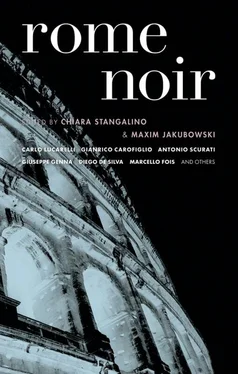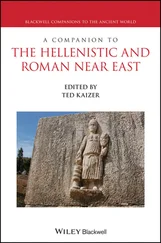Джанрико Карофильо - Rome Noir
Здесь есть возможность читать онлайн «Джанрико Карофильо - Rome Noir» весь текст электронной книги совершенно бесплатно (целиком полную версию без сокращений). В некоторых случаях можно слушать аудио, скачать через торрент в формате fb2 и присутствует краткое содержание. Город: New York, Год выпуска: 2009, ISBN: 2009, Издательство: Akashic Books, Жанр: Детектив, на английском языке. Описание произведения, (предисловие) а так же отзывы посетителей доступны на портале библиотеки ЛибКат.
- Название:Rome Noir
- Автор:
- Издательство:Akashic Books
- Жанр:
- Год:2009
- Город:New York
- ISBN:978-1-933354-64-4
- Рейтинг книги:3 / 5. Голосов: 1
-
Избранное:Добавить в избранное
- Отзывы:
-
Ваша оценка:
- 60
- 1
- 2
- 3
- 4
- 5
Rome Noir: краткое содержание, описание и аннотация
Предлагаем к чтению аннотацию, описание, краткое содержание или предисловие (зависит от того, что написал сам автор книги «Rome Noir»). Если вы не нашли необходимую информацию о книге — напишите в комментариях, мы постараемся отыскать её.
Rome Noir — читать онлайн бесплатно полную книгу (весь текст) целиком
Ниже представлен текст книги, разбитый по страницам. Система сохранения места последней прочитанной страницы, позволяет с удобством читать онлайн бесплатно книгу «Rome Noir», без необходимости каждый раз заново искать на чём Вы остановились. Поставьте закладку, и сможете в любой момент перейти на страницу, на которой закончили чтение.
Интервал:
Закладка:
by Antonio Pascale
Translated by Ann Goldstein
Quartiere Pigneto
The Architect
On May 20, 2006, a hot sunny afternoon, the young architect-in-training Riccardo Tramonti, thirty-one, was completing an exploratory tour of the Pigneto neighborhood. In a few minutes — at 4:10, according to the police report — and just a few steps away (around two hundred meters) from the café where he had stopped (he had felt himself becoming weak, and dizzy, and he wanted something cold), the crime would take place. Of what happened next, which he would witness as the involuntary protagonist, Riccardo knew nothing. At 5 in the afternoon the next day, which is when he woke up, after nearly twenty-four hours in a coma, the first thing the nurse said to him was: You’re in all the papers.
It was, in truth, the only sentence that impressed itself in his memory, at least until, finally, after seventy-two hours in intensive care, he was taken to a rehabilitation ward, where he could have visitors. The first people to cross the threshold of his room (his mother and father; his girlfriend came that evening, just before visiting hours were over) said to him, taking for granted that he was fine, You’re in all the papers. There are even television cameras outside.
Riccardo was supposed to draft a report on “structural changes in the Pigneto neighborhood.” The job had been commissioned by the City of Rome and was part of a larger project of assessing the redevelopment of outlying neighborhoods. The firm (quite a well-known one) where Riccardo had been working for three years now (without anyone having recognized his ideas, Riccardo claimed) had won the contract; as a first step, it was supposed to review “the anthropology of the neighborhood,” and the young architect-in-training had been sent there on this exploratory mission.
Riccardo’s first sensation, as soon as he set foot in the neighborhood, was that of belonging: His appearance was not at all out of place among the inhabitants. Riccardo was tall and thin. He always knew what to wear, how to dress, in order to emphasize the idea that he was an architect — that is, someone who could devote himself to the spaces of others because he was able to devote himself to (taking care of) himself. Although he had undergone a notable loss of hair while preparing for an exam (which covered engineering concepts through difficult and obscure applications of mathematics and physics), he had pretended not to be very concerned about this change in his physical appearance. The reaction to this unpleasant development had occurred in three stages: He had shaved his head, grown a beard, and bought some stylish nonprescription glasses with thin gold frames. He could see perfectly well but thought that the look he had created for himself more closely resembled what people expected to see when they shook the hand of an architect.
The neighborhood was in the process of transformation, this was the first thing he would have written in his report. What had at one time been a neighborhood on the outskirts, in every sense, was on the verge of becoming fashionable. There were fewer and fewer old men playing cards, cursing some saint because luck wasn’t on their side. Fewer and fewer old ladies sitting outside doorways on straw chairs, while hens pecked in the dirt nearby. And more and more young people like Riccardo.
Even if all of them hadn’t lost their hair (although a percentage that Riccardo estimated at between twenty-five and thirty-five resembled him in a striking manner), they could be defined in every respect as young people who were heading toward a rosy future. Young people with ideas, a little like Riccardo, who maybe struggled to express them completely, perhaps because (a little like Riccardo) they worked in cold and coercive structures (even if the furnishings of those structures conveyed the contrary). And yet these young people wanted to react to all this, to create an image of themselves that would nurture optimism. Therefore, the young people seemed truly young, and those who were forty or older did their utmost to seem like young people.
The neighborhood was in the process of transformation, so Riccardo would have written. The houses, built of mortar and stucco, without solid foundations, and once inhabited by poor people who got by as best they could, were gaining value in the real-estate market. Those poor people, since they had reached the age limit (approximately seventy) beyond which it is no longer possible to pretend that everything is all right, were selling (en masse) the houses they owned. With the money obtained they had (almost en masse) decided to move out of that neighborhood (or die in exotic places). The young people who bought (using in part the family inheritance) spent more than the value of the apartments (thus contributing to the distortion of the market) and proceeded to renovate them. Wealth was arriving and the pace of life was changing; the young seemed younger, hence with more future before them.
The neighborhood was in the process of transformation, so Riccardo would have liked to begin and end his report. It was, in fact, the last thought that his mind formed before he came out of the bar in a pitiful state, with his blood pressure falling rapidly and his legs trembling in a truly suspicious manner.
Francesco
The only thing Francesco, now nearly eighteen years old and a longtime resident of the Pigneto neighborhood, had understood in his life was: My father is a moron. This discovery had become a source of pride and power. His father was a moron because he didn’t understand anything, he wasn’t aware of anything, he didn’t look at anything: a moron, that was all.
Awhile back, Francesco had stolen a motorbike (Honda SH). Not that he needed it; he just wanted to go to the stadium. Since his motorcycle was broken, and since there are always people (Francesco said) who leave their bikes unlocked, hoping, therefore (not just unconsciously), that they will be stolen, Francesco, after seeing all the fans setting off for the stadium with their folded banners, was not overcome by fear (which a first theft generally involves) and, instead, inserted a screwdriver in the starter of the Honda SH, turned on the engine, and headed for the stadium on the stolen bike.
The motorcycle had to do with his father’s moronicness. It was really a perfect example.
His father was a moron, Francesco thought, on the way to the stadium, mounted on the stolen bike. Especially as Francesco considered him responsible for everything, even his own passion for the Rome team that he had transmitted at a tender age but then hadn’t known how to cultivate. Something that morons do in general — they open a pathway and are unable to follow it. Precisely because they are morons.
His father had in recent years suffered a financial collapse. It wasn’t that he had attempted to scale a significant height and, just before the peak, had fallen. In that case one might have appreciated his courage. No, he, the father, had had a financial collapse because he had fallen in love with someone else and had left the family: Francesco, his mother, and his sister. Not to say that the father had ever made a lot of money. Occasionally he wrote for television. They had come to live in Pigneto when it was not yet fashionable and prices were low. Francesco’s mother had repeated every other day that it was time to buy a house in this neighborhood, where houses were cheap. But he, the father, like the idiot he was, kept putting off the purchase: These houses are going to fall in on themselves soon, they’ll implode, they’re old, decaying. Let’s wait, when we have more money we’ll move to another neighborhood. Typical moron’s rationale. They continued to rent. Then he, the father, had the clever idea of falling in love with someone else. Another moron, worse than him. Of course, morons seek each other out, so to speak, they pair up. So the mother thought she’d better kick him out on his ass, and now he has to work double to pay two rents, for the house in Pigneto and for his own, practically a hovel, on the Prenestina. And this he does, the moron, a little to his woman and a little to the family. A little money here, a little there. Both women kick him in the ass, and he goes along like that, like the moron he is.
Читать дальшеИнтервал:
Закладка:
Похожие книги на «Rome Noir»
Представляем Вашему вниманию похожие книги на «Rome Noir» списком для выбора. Мы отобрали схожую по названию и смыслу литературу в надежде предоставить читателям больше вариантов отыскать новые, интересные, ещё непрочитанные произведения.
Обсуждение, отзывы о книге «Rome Noir» и просто собственные мнения читателей. Оставьте ваши комментарии, напишите, что Вы думаете о произведении, его смысле или главных героях. Укажите что конкретно понравилось, а что нет, и почему Вы так считаете.












